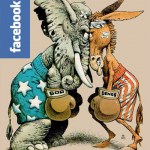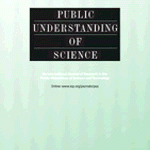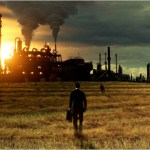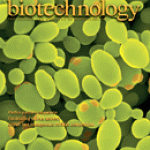
When I was in graduate school at Cornell, David Kirby was a course mate while he was working on a post-doc in science studies. Kirby was re-training from his former field as a geneticist, researching the influence of science consultants on major motion pictures.
One of his conclusions--published in a paper at the Social Studies of Science--was that science consultants are important to filmmakers because they can help lend a sense of realism and perceived legitimacy to a film, especially among the opinion-setting audience base who shape the success of a film via word-of-mouth and online buzz…
Over at the liberal blog site Daily Kos, the anonymous "Dark Syde" reviews the book Unscientific America. The review, unfortunately, echoes the all-too-common "fall from grace narrative" about the place of science in American society, a distracting if not harmful myth that we discuss in a forthcoming journal article and that I noted Friday.
All the trademark "fall from grace" metaphors, catchphrases, and references are included in the Daily Kos review including claims about a rise in "anti-science," "know-nothingness," open contempt for science, and a "long national slide into pseudoscience…
Over at MIT's Knight Science Journalism Tracker, the wise Charlie Petit has a great round-up of coverage of yesterday's Pew science survey. On what I described earlier today as a troubling "fall from grace" narrative in some reporting and commentary, Petit points to the obvious difficulties science reporters might have in covering an issue they deeply care about:
One notes that bylines [in coverge] tend to belong to science writers. Science writers can hope to cover science itself with a semblance of objective dispassion. But they have an inbuilt conflict of interest when the topic is the…
When I was invited by the Pew team earlier this year to make suggestions about items and questions to measure in their recently released survey on science and the public, I suggested that Pew ask a variation of a question that they have used in the past that queries respondents on the types of messages and information relative to politics they might receive in church. Given their expertise in the area, they were probably already well ahead of me in thinking along similar lines.
I was interested in the potential results based in part on a study I co-authored at the journal Political Behavior…
Somewhat predictably, several pundits and commentators have framed Thursday's Pew survey as supporting an all too common yet misleading "fall from grace" narrative about the place of science in society.
These interpretations proclaim a "growing disconnect," "a dangerous divide," a "widening gulf" and use other metaphors that are representative of what sociologists might label as a moral panic. This traditional fall from grace narrative about science argues for the need to return to a (fictional) point in the past where science was better understood and appreciated by the public. In the U.S…
[UPDATE: See this follow up on media reaction to the report.]
The Pew Research Center released today a major new survey report documenting Americans' views of science and technology and comparing these lay perceptions to a representative sample of U.S. scientists who are members of AAAS.
As part of a panel of experts, I had the chance to contribute input and ideas on the survey earlier this year. I have been eagerly looking forward to the findings ever since. Below I have jotted down a few key implications that come to mind on my first scan.
I will have more to say next week and probably…
A 1997 poster appearing in Central Park.
Perhaps the best commentary on the cultural reaction to Michael Jackson's death comes from the NY Times' columnist Bob Herbert. After describing meeting Jackson in the mid-1980s as one of the "creepier experiences" of his life, Herbert goes on to discuss how Jackson was the perfect symbol of the age, a retreat for Americans into fantasy during the years of the Reagan administration, rising poverty, and an escalating crack and drug epidemic. As Herbert writes:
In many ways we descended as a society into a fantasyland, trying to leave the limits and…
Our recent article at Nature Biotechnology (PDF, news release) has generated attention Down Under, with coverage appearing at the Australian Broadcasting Service and The Australian newspaper.
Both outlets do a good job of reporting on the central themes of the article, especially The Australian, which leads with a focus on the "miserly" nature of audiences, a reality that always seems to captivate journalists. Of course, there are also the traditional reservations voiced.
In a forthcoming article at the American Journal of Botany, my colleague Dietram Scheufele and I address these common…
Over at the Columbia Journalism Review, Cristine Russell is back from the World Federation of Science Journalists conference and reports on a panel of leading editors who are generally optimistic about the future of science coverage at their respective news organizations.
Editors at the Times of London and the BBC reported that their organizations were actually expanding their science beat. On the US front, the NY Times' science editor Laura Chang recognized the need to diversify their readership by "going broad," thinking specifically about what topics and dimensions of science are relevant…
If you are on Facebook, you have probably grown annoyed by the many causes and appeals that show up in your Notifications on a daily, if not, hourly basis. Like any new information technology, Facebook has generated a fair share of hype over its potential to "revolutionize" citizen participation and to ignite support for social causes. But like previous information technologies--ranging from the radio to the Internet--this initial hype is now starting to be replaced by a sense of realism about what Facebook "click through activism" can and cannot do.
Obviously, there's little doubt that…
The Colbert Report
Mon - Thurs 11:30pm / 10:30c
Is it Time to Care About Soccer?
www.colbertnation.com
Colbert Report Full Episodes
Political Humor
Jeff Goldblum
Many of you probably tuned in over the last week to the Confederations Cup tournament as the US national team pulled off a stunning semi-final victory over world #1 Spain and then followed with a close loss in the final to world power Brazil. In trademark ugly American fashion, Steve Colbert suggests that now that we (the US) are good in the sport, it's time to pay attention to soccer. Enjoy.
In the latest issue of the journal Public Understanding of Science, Lorraine Whitmarsh from the Tyndall Centre for Climate Change Research in the UK, publishes a study that finds that the terms "climate change" versus "global warming" matter to public perceptions. In a mail survey of a representative sample of 590 residents from the Portsmouth, UK region, Whitmarsh gave half the participants a questionnaire asking them to evaluate the risks and impacts of "climate change" and the other half of the sample a questionnaire asking them to evaluate the risks and impacts of "global warming."
From…
Timed with the World Federation of Science Journalists meeting in London, Nature magazine has put together a selection of recent articles focusing on journalism and science communication. The selection includes our recent article at Nature Biotechnology (PDF, news release).
[Contributed by guest blogger, Katherine Broendel]
The last time I posted, I wrote about the effects pornography and violent pornography may have on viewers' perspectives of women and sexual violence. Rather than stating an opinion, I provided a brief review of some of the studies I read as preliminary research for my thesis. On a related note, I want to explore the topic of sexually violent video games, or, rape simulation video games.
A couple weeks ago, an AAUW colleague and fellow AU grad student, Mandy Toomey, wrote an interesting blog post about rape simulation video games. I have…
I am in beautiful Madison, Wisconsin today to give this lecture at 7pm on campus. The talk is free and open to the public.
In the lead editorial at Science last week, Harvard University's Cristine Russell discusses the many emerging possibilities in science journalism. It's a mistake to frame current events as a "crisis," correctly explains Russell, but rather to look at trends as an opportunity to diversify, innovate, and experiment with new models and formats, expanding the network of science journalists into a truly global community, retraining journalists to produce content for new platforms and to cover related dimensions of policy and ethics, while broadening and diversifying audiences.
For journalists from…
Framing food problems as a matter of public accountability and sinister corporate control.
As I wrote earlier this week, the new documentary Food Inc. has the potential to significantly boost the public profile of a range of food-related problems, connecting them together under the perceptual umbrella of public accountability and corporate malfeasance.
In achieving this goal, it appears that Food Inc. has cleared the first hurdle, garnering strong reviews from the film critics who tend to drive the media narrative about a film including those at the NY Times, New York magazine, the…
Newspapers--and their localized science and environmental coverage--might be in decline across the U.S., but new ethnic media outlets, many of them in languages other than English, are thriving.
These outlets will be centrally important for reaching broader audiences with localized and relevant news and information about science, environment, and health. For example, many of these audience segments may have the greatest need for news about the health consequences of climate change or how to adapt to the rising price of energy. Yet, ethnic media are rarely if ever mentioned in discussions of…
MIT Knight Science Journalism Tracker has posted a PDF version of the Nature Biotechnology article. Previously, the article has only been available to readers with an institutional subscription. See also the news release.
Next week on Thursday, June 25 I will be visiting one of my favorite cities Madison, Wisconsin to give a lecture titled "What's Next for Science Communication?" It's part of a summer speaker series sponsored by the Dept. of Life Sciences Communication and the Holtz Center on Science and Technology Studies at the University of Wisconsin.
If you are interested in the themes discussed in last week's article at Nature Biotechnology, then you will definitely want to come out to the presentation. If you can't make it, online video will be available and Wisconsin Public Television will be re-…




